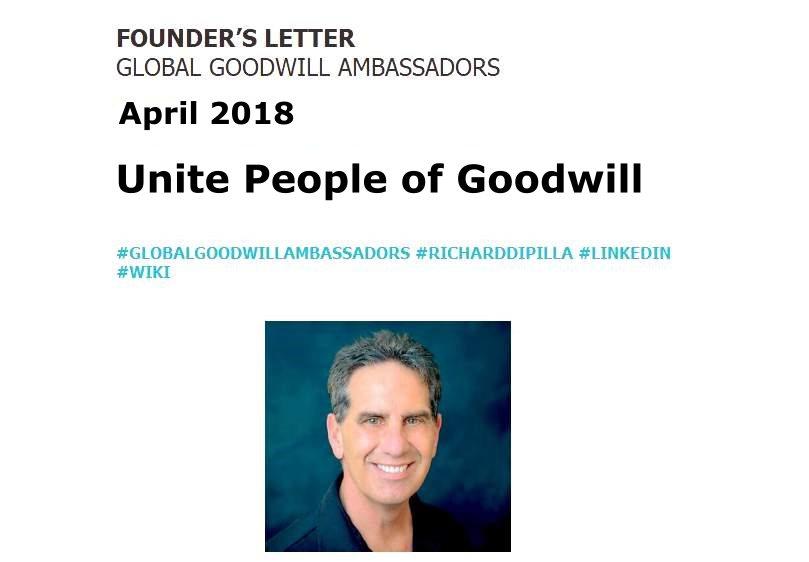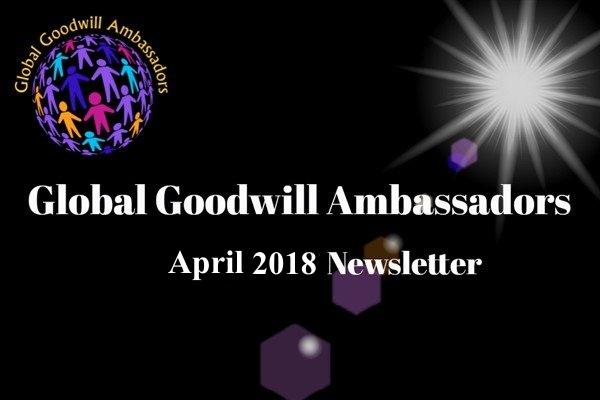
Global Goodwill Ambassadors (GGA) – Unite People of Goodwill
Global Goodwill Ambassadors has created strong friendships throughout the world. The value of these friendships is immeasurable. LinkedIn has a responsibility to provide a platform free of false profiles. When we receive a nomination from people and get substantiation through correspondence we can either say, nobody is good online so we don’t believe you, or we can evaluate what we are told, shown, and referenced and make a designation for that person. If there is a belief that anyone has the ability to check and verify beyond that, then they could question LinkedIn’s existence, how false passports exist, how Google and government websites can get hacked into.
To hold us to standards of infallibility is ridiculous.
The vast majority of Global Goodwill Ambassadors, are wonderful, loving, people. If they are not, they are removed or blocked.
What people are confused about is that there is no scam. We ask nothing of any Global Goodwill Ambassador. We are all the same. We have no headquarters, we keep no data, we do not run scandals, or do anything illicit. We are in fact, you.
I will not judge anyone, even those who make up lies and promote hate.
If any person has one iota of evidence of any behavior or scam they would have produced it. The only thing produced has been a ridiculous smear campaign based on hatred and jealousy. I speak to GGAs every day. I am available to take calls when I’m not working, and offer my email freely. Those who wish to see me can visit me or use a visual phone app. I hide from no one. To those who decided to leave GGA, that is their choice. Each day we get hundreds of people asking to become a GGA. We will tighten up our criteria but understand, doing so won’t stop people who want to hate.
I hope all GGAs see the love and kindness of our simple mission. Unite people of Goodwill. It’s that simple.
I started GGA with a loving heart. My heart has only gotten fuller. Let the haters follow their own path. Those of you who have felt the goodness and kindness of sharing the human experience will hopefully feel all the love I feel from all of the good people who are reading this newsletter.
Richard DiPilla
Reader and Supporter of Global Goodwill Ambassadors around the world!
The Newsletter of Global Goodwill Ambassadors is comprehensive. To make it easy for you to navigate through the newsletter here are the links which bring you directly to GGAs, text and images:
Goodwill is expanding … almost 450 new Global Goodwill Ambassadors in April 2018 – 3/12/2018 to 4/11/2018

Founder’s Letter by Richard DiPilla
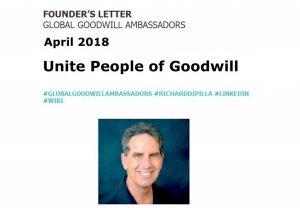
Chrissy Sykes introduces her My Body Is My Body program.
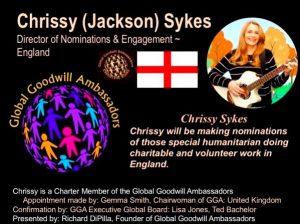
Quintus Andradi informs about the Loyola Campus building fund by the Society of Jesus – Jesuits – in Sri Lanka.
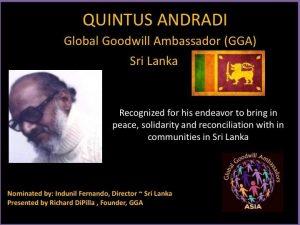
Alaha Ahrar about Successful versus Unsuccessful People.

Rosanna Bonci, our Italy chair interviewed by Deborah Levine.

Jon Klein says wise things in a few words. Combined with photos that say more than 1000 words, this results in guard rails for searchers.
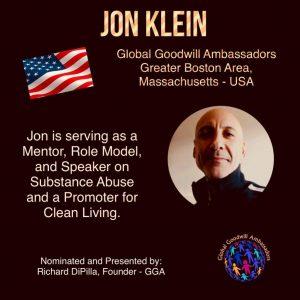
Excerpt from the book “To India, with Tough Love” written by Jaya Kamlani, Global Goodwill Ambassador (GGA). The reading example focuses on the work of Dr. Hanumappa Sudarshan with the Soligas tribal in India. It’s as exciting to read as a thriller. And it shows by way of example how the efforts of a single person can make the good in the world defeat the bad.
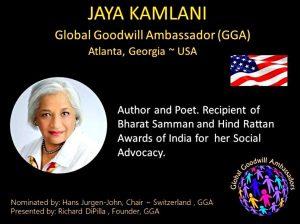
Rosemary Penrose is promoting Aboriginal Australian Culture and Art for several decades.

Global Goodwill Ambassador Herold Super describes the arrival and rise of a destitute young tennis player in Switzerland.
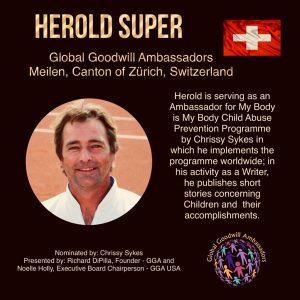
Maseeha Nabie, Global Goodwill Ambassador from Canada, is Former President of ‘Help for Humanity’, Toronto. She presents one of her poems: Seek.
Chrissy Sykes introduces her My Body Is My Body Program

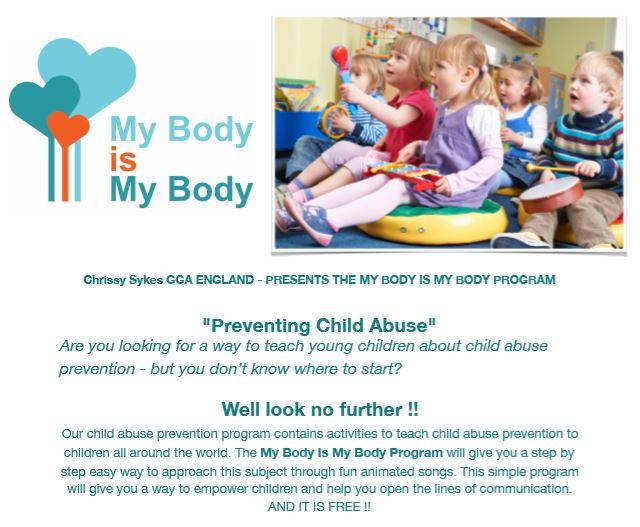
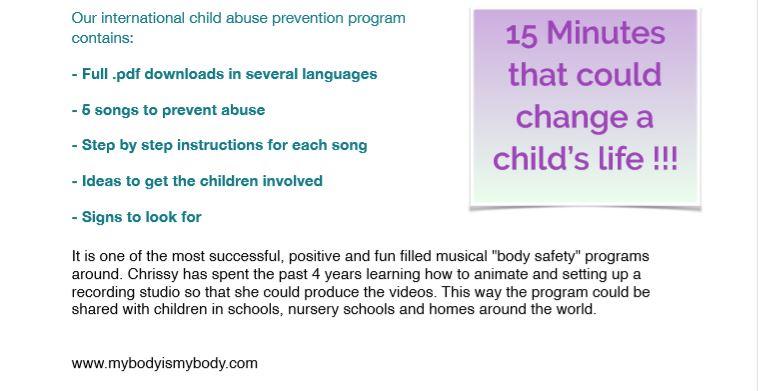
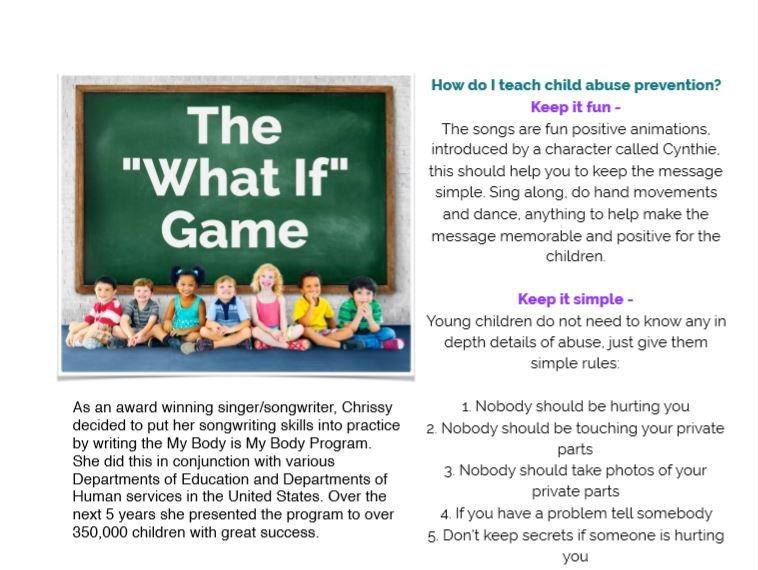
https://www.mybodyismybody.com
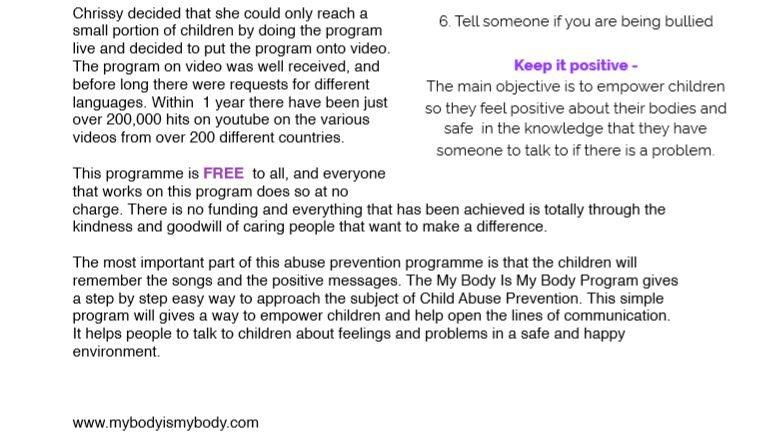

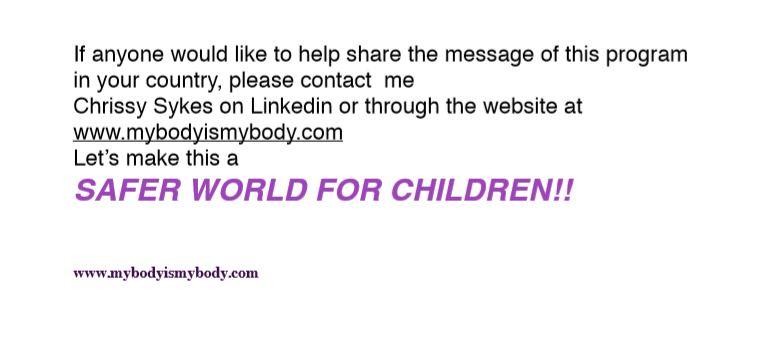
https://www.mybodyismybody.com
Successful versus Unsuccessful People – by Alaha Ahrar
Think about what makes successful people better than those who aren’t successful. Getting to the top is not easy, requires hard work and much sacrifice.
Successful individuals set goals and work to achieve them. Also, they believe in doing right, even when no one sees them.
However, when we consider those who aren’t successful, we often encounter two types. First, there are those who don’t work hard, who think mainly of their own interests, although they do appreciate the successful individuals around them. Then there are the unsuccessful people who are liars: they lie about everything and spend their lives trying to ruin others. They are good at making up numbers. They claim to be successful but have no proof.
And worst of all, these unsuccessful ones spend time denying the success and hard work of those who achieve.
Remember, hard work is like sunlight and truth. It cannot be hidden. Again and again the light of the sun and the truth of good people keep emerging to shine over everything, to brighten the earth and our lives.
Hard work and honesty are the truth
but lies are short and untrue
Sooner or later
Everyone will learn the truth
Truth lasts forever
Truth is stronger than any small or large lie
And liars are always losers
Because honest and true people are winners
Alaha Ahrar
Quintus Andradi about the Loyola Campus building fund by the Society of Jesus – Jesuits – in Sri Lanka
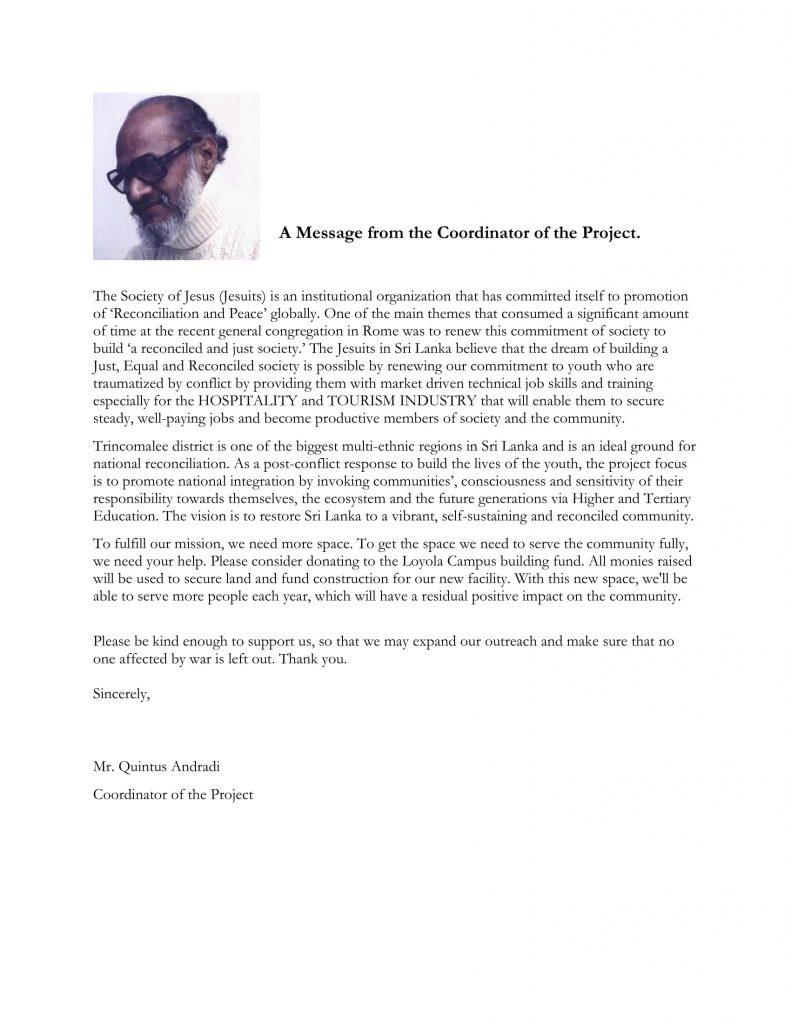
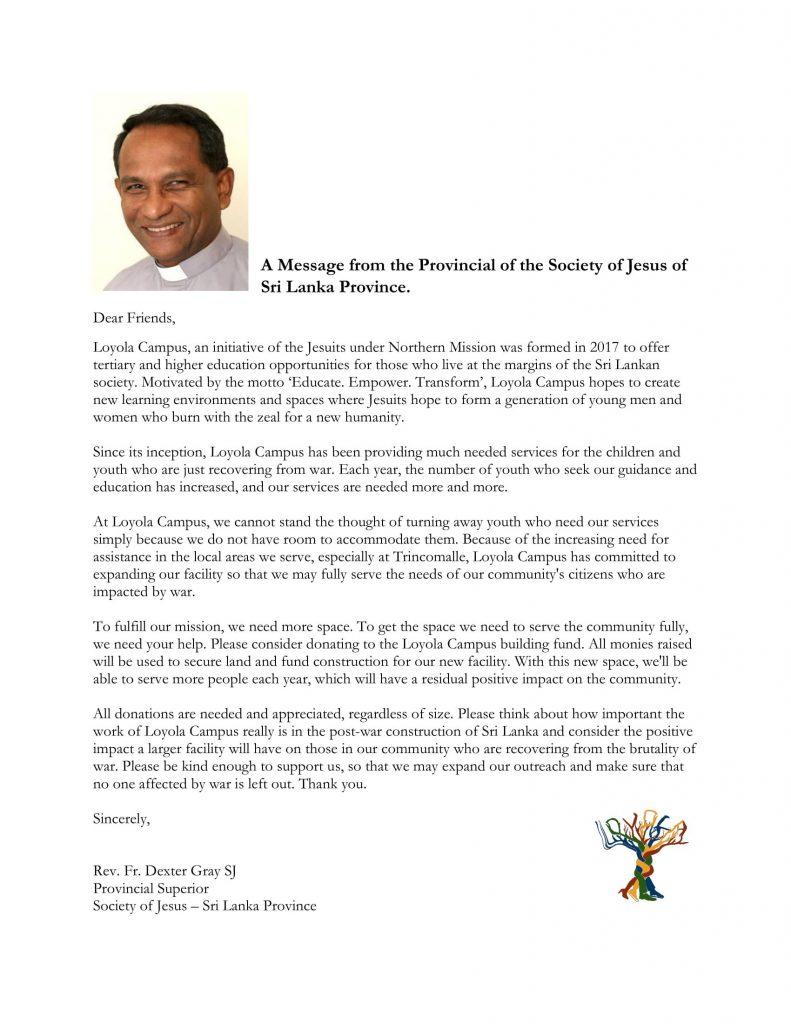
Rosanna Bonci interviewed by Deborah Levine

Rosanna Bonci is an author and real estate agent in Rome, Italy. She describes her background:
“I was raised in a Catholic family. Caring about others was a mainstream value, especially family and elders.”
Her passion is writing, “I used to write online for an Italian web site. I write novels and kids stories since 2009 and have taken creative writing courses”.
Rosanna helps the Paoletti Foundation with funds to build schools in Africa for children’s education. The Foundation provides their food and schooling. She sends a donation every month which goes to a school in Kenya to pay for the children education, books, teachers, school meals, and schooling support. She also supports Greenpeace, and Change.org, an organization promoting civil rights which is especially critical in non-democratic countries.
Gandhi is her mentor given his politics of acquiring with non violence. Also, Mother Therese is a life lasting example of virtuous life and right attitude toward life and it’s living beings.
Rosanna’s advice to others is inspiring,
“Find your passion in helping others cause it has roots in your soul which is the most valuable being on earth and in life itself.”
Jaya Kamlani, Global Goodwill Ambassador, USA

Jaya Kamlani could not receive two more awards in India due to health problems in 2017 – a stroke followed by surgery.
She is so grateful for the kind consideration of her merits. On May 11 2018 she was again asked to receive an award: the Global Icon & Leadership Award 2018 – the event took place on May 23 2018 in New Delhi, but unfortunately she could not receive it.
Rules that you must be present to receive the prize in person prevent this.
Asked if she is sad because of this she replies:
“I am just as honored that they considered me for the awards.”
She thanks all for wonderful support of her fight against poverty and for social justice and continues to work on her book on the 2016 US elections. She has been working on it for two years and plans to publish it at the end of 2019.
#JayaKamlani, #GlobalGoodwillAmbassadors
Dear Richard,
Dear Hans,
Dear Global Board,
Dear 3500 Global Goodwill Ambassadors in 100 countries,
— Thank you so much for all you do to support Goodwill around the globe —
At the October 2010 IDCA (International India Development Coalition of America) poverty conference held at Indiana State University, I met Dr. Hanumappa Sudarshan, the keynote speaker and recipient of India’s prestigious Padmashree award in 2000 for his work with the tribals.
Indiana State University is in Indiana, U.S., from where U.S. Vice President Michael Pence hails.
Later that morning, he joined Joyasree Mahanti, Ram Krishnan, and me on the poverty panel.
Given below is an excerpt from my book “To India, with Tough Love”.
Kind Regards,
Jaya Kamlani,
Atlanta, USA
Dr. Hanumappa Sudarshan: Empowering the tribals
All the wealth in the world cannot help one little village
If the people are not taught to help themselves
–– Swami Vivekananda
For decades, Dr. Sudarshan, a tribal rights activist, has been uplifting the Soliga tribe, whose 20,000 members live in the forested Chamarajanagar district of the southern state of Karnataka. After graduating from Bangalore Medical College in 1973, he joined the Ramakrishna Mission, a charitable health institution, and worked with the tribal communities in the Himalayan forest region.
When asked what inspired him, the doctor responded, “Swami Vivekananda’s nation-building and Gandhi’s philosophy for rural development.”
Leprosy in the Chamarajnagar region of Karnataka had prompted him to offer his medical services. It is not easy for a civilian to be accepted by a tribal community anywhere, he acknowledged, but the Soligas’ need for healthcare opened a doorway for him into the tribal community.
In December 1979 Dr. Sudarshan arrived at the Biligirirangan Hills (BR Hills), home of the Soliga tribe, who had no access to modern healthcare. But where were the tribal people? Scared of outsiders they had emptied the hamlets and gone into hiding in the woods when they heard of Dr. Sudarshan’s arrival. But the doctor did not lose heart. With the aid of his assistant, he set up a clinic in a one-room shack, which doubled as their living quarters. And the patients came –– patients with allergies, injuries from tree falls and wild boar and bison attacks, snake bites, worm infestations, and sickle-cell anemia. And they were helped. Next, the doctor and his assistant went in search of patients from hamlet to hamlet and found some more.
Determined to change the lives of the Soliga tribe, he converted the day clinic to a night school in the evenings. Seven students enrolled in his first class. They ate and studied together. When there was food, the teacher and students shared their meals. When food was scarce, they had watery porridge. Then help came from the Ramakrishna Mission of Mysore, where the doctor had worked before. They sent him used clothing for the tribals. Thus, life went on, one day at a time.
Soon word of the young doctor practicing medicine in the woods spread to the outside world. Many professionals, social workers, and philanthropists flocked to meet him and see his work. With their support, in 1981 Dr. Sudarshan founded the Vivekananda Girjana Kalyana Kendra (VGKK), a center for the holistic development of the Soliga tribe in the BR Hills.
The doctor eventually hired a small staff. The hut on the rock gave way to a ten-bed hospital, and the one-room night school expanded to a regular school for tribal children. A mobile health unit, with a doctor and a healthcare worker on board, visited the remote hamlets. Those who required hospitalization were transported back to the hospital, which was equipped with a lab, X-ray facilities, an operating room, and a well-stocked pharmacy. The doctor then moved on from healing patients to providing preventive healthcare services, such as vaccines for polio, whooping cough, and tuberculosis. He used both contemporary and traditional herbal cures. Tribals who live in the forests generally do not have major health problems such as cancer, diabetes, and heart disease, but those who live away from the forests have started developing these lifestyle illnesses.
The Soliga women seldom experience obstetric complications because they give birth to children in a squatting position. Natural births are common among them; cesarean births are very rare. Maternal mortality rates are low. Midwives, known as dais, help with the delivery and are consulted for infertility problems. They know how to turn a baby in the womb if the baby is in a breech position. Some can even tell the sex of an unborn child without access to an ultrasound machine.
Uma Devi, who started a nursery, looked after the little children. She recalls the early days when the children attended school merely for free lunch. She spent her mornings washing them, trimming their hair and nails, and teaching them personal hygiene. Soon the children learned to bathe themselves.
When a primary school was established in 1982 with funding from the state government, finding students was a challenge. The school had two classes and two teachers.
The children hung around until the midday meal was served and then vanished into the woods or climbed up trees and threw sticks and stones at the teachers. Sometimes they climbed out the window after the teacher called the roll. The staff members would search for them and find some of them wandering down the road, or hanging out at the nearby lake. They would bring the children back to class and punish them. But the children remained unrepentant and continued to skip classes.
The parents also were not cooperative. They did not want outsiders to come and change their traditional ways.
In an effort to reduce the number of runaways, the teachers went to other hamlets to recruit children to stay at the school’s residential facilities. Some teachers and social workers carried children on their backs; others played the part of the Pied Piper, singing songs all the way to school while the children followed them. Occasionally, the children were hauled in on bullock carts. But that did not help, either. The children ate during class hours and escaped from their classes to take a nap or pluck fruits from the trees. This reckless behavior continued into their teenage years.
Meanwhile, funds poured in from philanthropists and social activists. The Christian Children’s Fund sponsored 800 children and offered incentives, such as a cow or cash to families who enrolled their children in the residential school program. The first class of students was much older than those in the same grade at city schools. This presented a dilemma, as the children were already set in their ways and disciplining them was difficult. Nevertheless, they had a peaceful temperament and were simple and honest.
The school, now with an enrollment of about 500 students, follows the ancient Gurukul model, where the teacher lives on the campus with the students and guides them like a guru. This promotes greater bonding between them. They share food, shelter, and dorm chores, and nurse each other in times of illness. Dormitories blend in with the natural environment. The forest children enjoy sleeping on bunk beds. The staff and students gather wild mulberries and other fruits. They grow vegetables, millets, and corn. They learn to cook, clean, collect firewood, attend to vegetable gardens, raise silkworms and poultry, and maintain beehives. They learn to cultivate spice crops, such as coffee, ginger, turmeric, and pepper.
The school building is designed with open architecture and large windows to let in fresh air and sunlight so the forest children do not feel constrained, but rather experience learning in a natural environment. The school day begins with assembly and prayers. No textbooks are used. Instead, stories, experiments, games, and activities are used to teach the basic concepts of science, mathematics, history, and geography. Group discussions and mock elections teach the children civic lessons and help them develop leadership skills. The children are taught Kannada, the state language. The science and computer labs, the library, the drama school, and the museum are housed in separate buildings. Since the tribal society is deeply rooted in nature and traditional culture, students also learn about tribal matters, including the cultural alienation of tribal societies and ecology conservation. They are trained in critical thinking, decision making, problem-solving, and communication skills.
Sunday mornings are reserved for meditation. Thursday evenings are filled with storytelling, singing, standup comedy, and drama. Sometimes, children learn around campfires. They are taught to live a life of empathy, kindness, and responsibility. Every year they participate in educational trips to historic sites in southern India. They also have to participate in an annual essay competition on the life and works of Swami Vivekananda, the great Indian philosopher of the nineteenth century.
With this holistic curriculum, the student dropout rate fell to 3 percent, while the state’s dropout rate was 31 percent and the national rate was 53 percent. Upon graduating from the primary school, the students attend the middle school and then the high school in the BR Hills. The Soliga students also fared well on the state exams, and their scores were on par with those of the city students. Since tribal children have higher physical endurance, they excel in sports. Over the years, a drama school has sprung up and a rural development university and the Industrial Training Institute have been launched. The institute offers six-month technical courses in welding, home appliance repair, and electrical motor rewinding. It also offers two-year courses in drama and forest conservation and utilization. The tribal children have thus blossomed with confidence.
Once Dr. Sudarshan’s medical practice and education program were established, he moved on to water and sanitation issues. Through street plays, he encouraged people to eat nutritious foods. Since they suffered from malnutrition, the doctor thought of income-generating activities so the tribal community could afford to eat better. The tribals learned about dairy farming, fishing, and cultivating cash crops. They acquired vocational skills, such as basket weaving, tailoring, welding, candle making, and honey and food processing. They learned about organic farming and rainwater harvesting. The community’s Village Resource Center offers telemedicine and virtual learning services.
The VGKK center then got involved in community development. The tribal people learned to build low-cost housing, gas energy plants using manure, drinking water facilities, and roads. They nurtured orchards and kitchen gardens. They grew medicinal plants for herbal cures. Each family received a cow for milk. They consumed some and sold the extra at the dairy collection center. They owned parcels of land, became self-reliant, and were empowered.
In 1983, the state government of Karnataka passed the Panchayati Raj Act, which empowers people at the village level to elect their own representatives to the state government. Three years later, for the first time, two tribals from Chamarajnagar district, home of the BR Hills, were elected. The Soliga tribe was now motivated to become politically and socially active in the community. The tribe led a peaceful protest for better wages and to raise tribal rights awareness. Those who profited from the Soligas’ exploitation were upset by the protest, as 80 percent of the Soligas were bonded laborers. Two tribal leaders trained youth with leadership skills in several counties, taluks. The empowered youth then protested against bonded labor and harassment from police and forest department staff. Women also participated in these street marches.
It was then that Dr. Sudarshan and the VGKK management team learned the tamarind trees on the Soligas’ property were contracted out to a politically astute businessman. Years before the doctor’s arrival, the tribals had been forced to sign away their rights to the trees, with their thumbprints, to the robber baron who made Rs 4,000 from the fruit of just one tree but paid only Rs 100 to the tribals. The tribal leaders informed their communities about it. With the help of social workers, they got the Soligas organized. Joining forces with another local tribe, they demanded their land rights back, to no avail.
Come harvest time, the shrewd businessman arrived with a band of police and once again reaped a bounty from the tamarind trees.
The tribal community demonstrated. To quell the protests, the police arrested twelve Soligas and Dr. Sudarshan. The doctor refused to apply for bail and was moved to the jail in the city of Mysore. Through the media, news of his imprisonment traveled far and wide. Many people came to the jail demanding his release. Within forty-eight hours, Dr. Sudarshan and the tribals were freed. The land issue was settled in favor of the Soligas, and the doctor was hailed as a local hero.
The next challenge was to free the bonded laborers. But bulldozer operators had begun to clear the forests to make room for new development, and miners were using dynamite in Chamarajnagar district where black granite is found in plenty. The deforestation and mining operations had received approvals from officials. Both operations exploited nature and made life difficult for the Soligas, who then protested against miners dumping debris on their land. Still, the mining activities continued. With the forests being cleared, the Soligas’ homes were at risk.
When the Wildlife Protection Act was implemented in 1972, the forest land was taken over by the government. In the name of preserving wildlife and forests, the Soliga tribe was prosecuted for living there. In the following decade, tribal people across Karnataka state were herded away by forest officials.
Twenty years later, in 1992 the state declared BR Hills as a wildlife sanctuary. Land cultivation, hunting, and collecting firewood were banned, even for the Soligas tribe who had been living there for generations. Forest officials razed their hamlets or set them on fire. Those who continued to live in the forests were either evicted to the periphery, where they worked as bonded laborers in the neighboring tea and coffee plantations or forced to live closer together in settlements so park rangers could monitor them. This made them lose contact with their own tribe in another hamlet.
For tribals who were moved to the settlements, the main source of income came from the harvesting and sale of non-timber forest products, such as honey and herbs. Since they were illiterate and lived in fear of the outside world, they were exploited and cheated out of their earnings by government officials, contractors, and traders. They could only barter forest products with city traders in exchange for cheap clothing and kitchen utensils. The traders then had the tribal people use their thumbprints to sign false documents stating they had been paid.
While the Soligas and other tribes were exploited, industrialists across India were allowed to mine and haul away granite and timber from tribal land. Poachers were permitted to hunt in the woods for rabbits, deer, wild boars and peacocks. Dealers and traders were given state licenses to sell alcohol to the tribe and buy forest products from them.
Sale of alcohol had been banned within ten kilometers (six miles) of a temple or a tribal settlement in the state of Karnataka since 1989. The BR Hills community was considered a liquor-free zone, yet liquor licenses were issued to vendors who sold alcohol in tribal areas. Liquor shops also sprung up in the hamlets. This led to domestic violence, as the men spent their money on alcohol while their children went to bed hungry. The women got together and protested. They asked officials to revoke the liquor licenses, but the officials refused. In protest, the tribal women blocked the roads. The police and local officials threatened to take action against them, but the women refused to back down until their demands were met. The women won. Next, the Soliga community decided to impose fines of Rs 1,000 ($25 then) on drunkards who created a nuisance in their neighborhood.
For a while, the tribal area remained a liquor-free zone until an entrepreneur set up a liquor distribution center at his house on the hill. He sold arrack, a rum-like alcoholic drink made with malted rice and toddy or molasses. Everyone, including the police, knew the man sold arrack, but no one could catch him in the act. When the locals told him to stop selling liquor, he denied ever selling it. The women asked the Karnataka state commissioner to revoke his license, but the official denied ever having issued one to him.
Refusing to give up, the tribal women sought help from the women’s self-help groups and social workers. Together they decided to inspect vehicles going up the hill on January 24, 2004, the day the next consignment was to be delivered to the man on the hill. On the awaited day, the women and children stopped a jeep driving up the steep path. Upon inspection, they found 182 packets of arrack inside. They summoned the police, the commissioner, and the media. The liquor license was shredded and the vendor arrested. Following the arrest, no more liquor was sold on tribal property, but the die-hard drinkers managed to sneak in a packet or two under their turbans or in vegetable sacks when they returned from the city.
Deforestation in the country has led to a dwindling number of wooded areas, forcing wildlife and forest dwellers to coexist. But this was not the case with the Soliga community at BR Hills. In 2004 the government banned all forest dwellers across the country from accessing forest products.
In other parts of the country, entire tribal communities have been displaced. More than 300,000 families have been driven to destitution and starvation. In the state of Madhya Pradesh, more than 125 villages have been burned to the ground. Torture, bonded labor, extortion, and sexual assaults are common.
Meanwhile, the Soligas continued to fight for their rights to access forest products and to their ancestral land. With the passage of the Forest Rights Act of 2006, the community was given the right to manage and protect forest land and wildlife in this tiger reserve area. It also entitled the Soligas to harvest on forest land as well as collect, use, and sell forest products.
Five years later, in a landmark victory in 2011, the Soligas tribe was also granted the right to use the forest territory as its ancestral land. The deed protects the Soligas from future eviction by the Karnataka state authorities. According to Stephen Corry, director of Survival International, “The Indian government is beginning to realize that tribal people are the best conservationists, by far. If only the rest of the world could catch on. Evicting tribespeople from their ancestral land in the name of ‘conservation’ is not only illegal and destroys them, it also spells disaster for the local environment and wildlife.”
The organization’s website states, “Communities are just as badly affected whether they lose their land to conservation projects or other ‘developments’ such as mines and dams. Their health, livelihoods and culture suffer immeasurably. Once self-sufficient and independent, conservation refugees typically find themselves dependent on hand-outs, divorced from the land and livelihoods which sustained them. This plunges the community into poverty and all that entails –– poor health, poor nutrition, severe distress, and mental illness. They often find themselves on the receiving end of racism and discrimination from the authorities and the non-tribal society.”
End of excerpt.
Jaya Kamlani:
I am including 2 video links. These are links that are mentioned in my book that the doctor told me I could use. I am sure you will like them, as they are very informative.
You will see the doctor sitting with the children outside his one-room hut, when he arrived at the B.R. Hills in 1980. You will also notice the school that the Soligas tribal people built for their community’s children, as well as the forest products they produce for their livelihood. The Soligas tribe is very ancient, dating back to about 800 to 1,000 B.C. They live in the woods and are a very spiritual group of people.
Video 28:33 minutes, “Gorukana: The Bamboo Children” published by Deepashree Mysore Ravi, February 11, 2013.
* Note: Bamboo Children means “Children of the forest.”
Video 25:16 minutes, “Gorukana: A Film on Tribal Development,” published by Deepashree Mysore Ravi, February 13, 2013.
** Note: Delayed start of the video.
Rosemary Penrose has been promoting Aboriginal Australian Culture and Art for several decades.

Dear Richard,
Thank you for my acknowledgement today as a Global Goodwill Ambassador. I am very proud …. Thank you. I have had many congratulations.
Received this message of thanks from Apache Chief Taina Amayi for acknowledgement of my promotion of Aboriginal Art and Culture and helping to Close the Gap and unite First Nations people worldwide. It is an Honor and a Blessing!!!
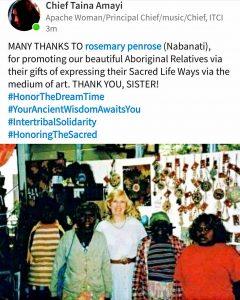
My reply:
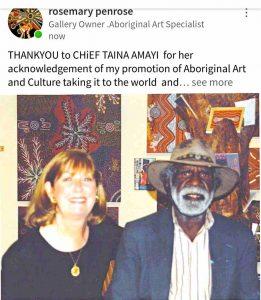
Richard DiPilla:
Wow that’s awesome. I want to share this with the publisher of our GGA newsletter Hans-Jürgen John!
Rosemary Penrose:
Thank you, Richard
Please share it … sending love not hate worldwide !!!
Art speaks a thousand words !!!
Kind Regards,
Rosemary Nabanati Penrose
Global Goodwill Ambassador Australia
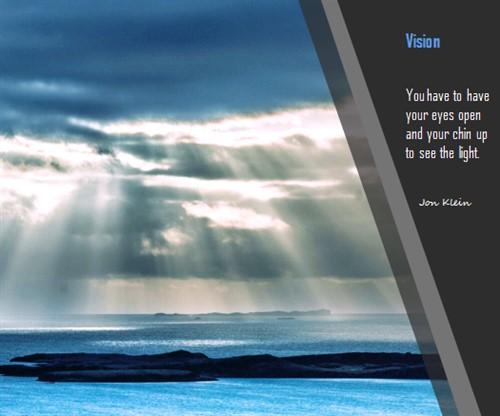
Herold Super, Global Goodwill Ambassador, Switzerland

A True story by Herold Super.
Living in the so-called ‘Gold Coast Area’ at the Lake of Zürich, Switzerland – we say ‘Oligarch County’-surrounded by at least 35.000 Millionaires …
On a sunny day, the very pretty moms drive their Range Rovers…Pretty daughters their Mini Coopers and dad in his Ferrari, Lamborghini or Porsche Old Timer along the boulevards at the Lake. For lunch, they meet in the ‘Leue Gärtli’ on the waterfront in Meilen, ‘Frascati’ in Zürich or in one of the hundred fine restaurants around the lake. A spaghetti Bolognese with salat and a drink is served for a ‘robbery on your wallet’ price, for any ‘Not Swiss Citizen’.
It’s mid-January 2005. The Stork International Tennis Europe U-14 Trophy, Cat.2 Tournament, Entry List has been published on the Tennis Europe Website. The Tournament has reached a high appreciation standard with the players and coaches on the Tennis Europe Junior Tour. As the founder and tournament director, I get a call from Moscow. ‘Ello? Ziss iss Nataaasha from Moscow, Mr. Zuper???’ You could imagine the beauty of this ‘Natasha from Moscow’ by her sexy voice. She wanted me to reserve the Presidential Suite, a Junior Suite and a Single Room at the five-star Hermitage Hotel in Kusnacht at the Lake. ‘Ziss iss for my Bosss and hisss Zon and the coach. One week! And a Mercedes 500 SEL, Chauffeur-driven. ‘No hospitality’ I counter,’ the boy has to play Qualification! (the Cut MD was somewhere at TE 85 that year). You have to reserve your request yourself, Natasha. – We, the organizers, ending up with the bill of at least 30.000 Euro … the fish disappeared? No way!!! – ‘I will E-Mail you all the info you need!’ ‘Thank you Mr. Zuuperrr’.
Thursday, mid-February, Sign In Quali is tomorrow, Friday between 4 and 6 pm. A clearly sharp dressed Man with the posture of a Russian Bear, accompanied by a big boy for a U-14 and an ‘Adidas Track-Suit Wearing Former Box-Champion’ walk into Sportscenter Stork.
‘Good afternoon Mr. Super, I’m Mr. A and this is my son B and his coach C. We are from Moscow. My secretary spoke to you on the phone. We would like a practice court?’ He was lucky. Somebody canceled their reservation. One of the seven Indoor Courts was free at 6 pm. Right next to me where I was coaching…
It didn’t take long for me to figure this boy out. Big, slow, poor technique based on power. Not good enough for the Main Draw. The ‘poor’ boy had to play a strong player from Germany in the Quali. Saturday morning at 9 am … At 10 am, the 6-0, 6-0 for the German was on the scoreboard…. The Russian bear turned to me and said: ‘OK! We take a week of vacation in beautiful Switzerland! How far is it to St. Moritz???’
Behind him stands a man in his fifties, no more teeth and looking like one of the Clochards, you find underneath the bridges of the Seine. He was from Bosnian Herzegovina. The Balkan War ended only a couple of years ago, leaving the people with nothing. Yesterday, during the Sign In, he walked into the Tournament Office with his Son. I first thought ‘he’ was a ‘she’…… long hair, very fine features in his face, sparkling eyes, moving like a Jaguar, not too big. ‘Excuse me, Mr. Super. We are from Bosnian Herzegovina and I want to ask, can my boy be Alternate on Sight?’ His English sounded well… ‘Just sign-in and we can tell you at 6 pm!’
God has its own ways to deal with its Angels. The boy entered the Quali … 6 pm Friday evening. It was snowing outside. Minus 10 degrees Celsius, freezing! The father without teeth asked me: ’Can he put his tent up outside? They don’t have money for accommodation. And if he helps in the restaurant collecting the plates of the Guests and do dish-washing, can he get the ‘leftovers’ for him and his son??’
One hour after the Sign-In had closed I went onto the parking lot. I hear somebody hitting a ball against a wall. It is the boy from Bosnia. ‘I still have a spot free on a practice court. You can have it if you want to? I organize you a partner!’ His eyes were shining. I continue: ‘I have a Squash Box, heated, for you and your dad tonight. We will put some blankets in there!’ He reacted very humbly: ’Thank you, but we can sleep in our tent?’ ‘No Ways’, I counter ‘you freeze to death tonight’.
It’s 10 am Saturday morning. The Russian bear says Goodbye. Mr. ’no teeth’ takes the moment: ‘Thank you very very much for everything, Mr. Super. When my boy qualifies for the MD, can he get free meals?’ He doesn’t know that I was already in the Office at 7 am that morning and I gave his son practice balls to hit the Wall inside. One of our coaches is also early there with his 8-year-old son. The boy from Bosnia asks whether the boy would like to hit a couple of balls with him? Flattered by this invitation, the little boy gives all he’s got. I can see what kind of diamond hides in the boy from Bosnia. I tell his dad: ‘He qualifies? I give you free hospitality!’
The boy crashes all his opponents…. In the Semi-Final Main Draw his legs cannot help him anymore. In a 3-set fight, he almost collapses but doesn’t give up, he finally has to capitulate.
It was the End of a Beginning! 5 years later the boy becomes U-18 European Champion and now DAMIR DZUMHUR is one of the most respected players on the ATP Tour.
Whatever happened to the Oligarch Son? Most probably Junior Oligarch …
Maseeha Nabie, Global Goodwill Ambassador from Canada, is Former President of ‘Help for Humanity’, Toronto. Here is one of her poems:
Seek light
even in the darkest places
Seek hope
even in the harshest conditions
Seek happiness
even in the gloomy moments
Seek success
even in the consistent failure
Seek your right
even if you have to sacrifice
My dear sisters, you can’t carry this huge burden on your shoulders anymore. You have done what you were expected to do and yet they have hurt you, burned you, shaved your head, cut your nose, treated you like a slave. That is inhumane way of living. I know you kept quiet because you thought THIS will change. But it wont change if you don’t speak up. It wont change if you don’t show how strong and brave you are. It wont change if you don’t teach them a lesson. It wont change if you suffer and swallow your pain. Don’t do this to your self. Take whatever step you have to take to stand up for your pride.
You are a lion.
Roar. Roar out loud
The earth will shake
The thunders will light
The wind will blow
The mountains will break
To remind you of your strength.
YOU are nature.
You gave birth to all and all is made for you.
Maseeha Nabie
Former President
Help for Humanity
GGA Canada
Goodwill is expanding …
new Global Goodwill Ambassadors in April 2018 – 3/12/2018 to 4/11/2018

| Name | New Role | ||
| Yon Ta | Director of Nominations & Engagement ~ Australia | ||
| Joseph Dalton | Director of Nominations & Engagement ~ UK | ||
| Veena Gaur | Co-Chair ~ India | ||
| Nia Maria Haaranen | Director of Nominations & Engagement ~ The Baltics | ||
| Finland ~ Sweden ~ Norway | |||
| Fardus Dirir | Director of Nominations & Engagement ~ Africa | ||
| Castro Mariam Jen | Director of Nominations & Engagement ~ USA | ||
| Shruti Rana | Director of Nominations & Engagement ~ UAE | ||
| Lena Landgren | Director of Nominations & Engagement ~ Sweden | ||
| Basma (Mohammed Zeineddine) EL ZEIN | Director of Nominations & Engagement ~Saudi Arabia | ||
| Andrew Benson Greene, Jr. | Director of Nominations & Engagement ~ Sierra Leone | ||
| Farhana Chowdhury | Director of Nominations & Engagement ~ Bangladesh | ||
| Indunil Fernando | Director of Nominations & Engagement ~ Sri Lanka | ||
| Ron Malhotra | Director of Nominations & Engagement ~ Australia | ||
| Fateh Ali | Director of Nominations & Engagement ~ Asia ~ Singapore, GGA | ||
| Khassiyat Saidiganiyeva | Director of Nominations & Engagement ~ Kazakhstan | ||
| Raymond Kamb John | Director of Nominations & Engagement ~ New Guinea | ||
| April Newsletter 3/12/2018 | |||||
| Name | Country/Location | Role | |||
| Adila Ahmadi | Afghanistan | GGA | |||
| Ahmadullah Ahmad | Afghanistan | GGA | |||
| Esmatullah Saidy | Afghanistan | GGA | |||
| Hakim Akbarzada | Afghanistan | GGA | |||
| Ilham Niazi | Afghanistan | GGA | |||
| Muhammad Rafiq Aminzoy | Afghanistan | GGA | |||
| Mustafa Hasani | Afghanistan | GGA | |||
| Belgacem Tadjine | Algeria | GGA | |||
| Fairouz Habache | Algeria | GGA | |||
| Omar Baali | Algeria | GGA | |||
| Tassadit Cherfaoui | Algeria | GGA | |||
| Juan Carr | Argentina | GGA | |||
| Nicolas Baqueiro | Argentina | GGA | |||
| Samuel Bernardo Teitelman | Argentina | GGA | |||
| Ashley Garrett | Australia | GGA | |||
| Danielle Robertson | Australia | GGA | |||
| Gavin Latz | Australia | GGA | |||
| Jobhib (Jude Ediae) Ediae | Australia | GGA | |||
| Kurt Nielsen | Australia | GGA | |||
| Lenin Jacab | Australia | GGA | |||
| Lu Senituli | Australia | GGA | |||
| Melissa Griffiths | Australia | GGA | |||
| Nhi Dao | Australia | GGA | |||
| Peter Quinn | Australia | GGA | |||
| Ria Verma | Australia | GGA | |||
| Richard Ernster | Australia | GGA | |||
| Richard Parmar | Australia | GGA | |||
| RimZan ZacKeriya | Australia | GGA | |||
| Susan Robertson | Australia | GGA | |||
| Thomas Keplar | Australia | GGA | |||
| Tracy Bevan | Australia | GGA | |||
| Arif Anik | Bangladesh | GGA | |||
| Kamrul Islam | Bangladesh | GGA | |||
| Md Abed-Ur- Rahman | Bangladesh | GGA | |||
| Miah Mohammad Alim Al Razib | Bangladesh | GGA | |||
| Shahida Akhter | Bangladesh | GGA | |||
| Andrey Makhanko | Belarus | GGA | |||
| Birgit Van Hout | Belgium | GGA | |||
| Sydney De Vos | Belgium | GGA | |||
| Egidio Garcia Coelho | Brazil | GGA | |||
| Julio Cesar Fonseca | Brazil | GGA | |||
| Lidice Marques Xavier | Brazil | GGA | |||
| Marcia Ballariny | Brazil | GGA | |||
| Alice Nsengiyumva | Burundi | GGA | |||
| Ben Girn | Canada | GGA | |||
| Chidi Cadet Nwanyanwu, Reverend Dr. | Canada | GGA | |||
| Donovan Bailey | Canada | GGA | |||
| Dr. Verna Jackman-Bishop | Canada | GGA | |||
| Kerry Gibson | Canada | GGA | |||
| Mahsa Kiani | Canada | GGA | |||
| Mireille Chery | Canada | GGA | |||
| Peter Drozdiak | Canada | GGA | |||
| Saira Hayet | Canada | GGA | |||
| Sharon Graham | Canada | GGA | |||
| Sultan Akif | Canada | GGA | |||
| Tanmay Bakshi | Canada | GGA | |||
| Viktoria Drozdiak | Canada | GGA | |||
| Margo O’Sullivan | China | GGA | |||
| Salma Saidane | China | GGA | |||
| Alexandra Henriquez | Colombia | GGA | |||
| Dr. Zlatka Roksadic Vrancic | Croatia | GGA | |||
| Gladman Mundingi | Cyprus | GGA | |||
| Antonia Nicol | England | GGA | |||
| Betty Skeet | England | GGA | |||
| Carolyn Moody | England | GGA | |||
| Kyle (Kwan Long) Wong | England | GGA | |||
| Latoya Maynard | England | GGA | |||
| Mandy Sanghera | England | GGA | |||
| Manisha Tailor | England | GGA | |||
| Natasha Hussein | England | GGA | |||
| Robin Marsh | England | GGA | |||
| Sami Junnonen | Finland | GGA | |||
| Daniel Le Sourd | France | GGA | |||
| David D’Alessandro | France | GGA | |||
| Fatmeh Ouaibi | France | GGA | |||
| Michel Gay | France | GGA | |||
| Mohamed Bendjilali | France | GGA | |||
| Nassera Meziane | France | GGA | |||
| Noelle Vye Gaffin | France | GGA | |||
| Stephanie (Schuler) Garnie | France | GGA | |||
| Youness Bazzin | France | GGA | |||
| Alagie Jeng | Gambia | GGA | |||
| Alhaji Jeng | Gambia | GGA | |||
| Amadou Scattred Janneh | Gambia | GGA | |||
| Bai Mass Saine | Gambia | GGA | |||
| Haddy Faye | Gambia | GGA | |||
| Hans Loum | Gambia | GGA | |||
| HRH PRINCE EBRAHIM | Gambia | GGA | |||
| Lamin Tamba | Gambia | GGA | |||
| Malick Jarjue | Gambia | GGA | |||
| Malick Sallah | Gambia | GGA | |||
| Mariama Colley | Gambia | GGA | |||
| Momodou Barry | Gambia | GGA | |||
| Momodou M Joof | Gambia | GGA | |||
| Serign Ceesay | Gambia | GGA | |||
| Aji Fatou Gaye | Gambia | GGA | |||
| Isatou Jallow | Gambia | GGA | |||
| Mohammed Kah | Gambia | GGA | |||
| Bianca Matras | Germany | GGA | |||
| Nahid Shahalimi | Germany | GGA | |||
| William B. Hazel, LCSW, LADC | Guam | GGA | |||
| Rchael Smets | Holland | GGA | |||
| Amba Prasad Shukla | India | GGA | |||
| Anil Joshi | India | GGA | |||
| Arvind Sharma | India | GGA | |||
| Ashesh Das | India | GGA | |||
| Devi Prasad Shetty | India | GGA | |||
| Diptanu Chaudhuri | India | GGA | |||
| Dr. M.A. Hasan Shani | India | GGA | |||
| Dr. Monika Singh | India | GGA | |||
| Dr. Nikkie Grover | India | GGA | |||
| Dr. Niti Kapoor | India | GGA | |||
| Dr. Pooja Sharma | India | GGA | |||
| Dr. Raj Singh | India | GGA | |||
| Dr. Rupal Agrawal (Tyagi) | India | GGA | |||
| Dr. Seema Rekha | India | GGA | |||
| Dr. Shivani Khetan | India | GGA | |||
| Harish R | India | GGA | |||
| Himanshu Singh | India | GGA | |||
| Inamul Haque | India | GGA | |||
| Ishran Mishra | India | GGA | |||
| Khushvendra Pharroda | India | GGA | |||
| Mahesh Jadhav | India | GGA | |||
| Maheswar Satpathy | India | GGA | |||
| Manashimaya Duttagupta | India | GGA | |||
| Manoj Kumar Kandala | India | GGA | |||
| Meenakshi Sawhney | India | GGA | |||
| Menka Pathak | India | GGA | |||
| Michelle. M | India | GGA | |||
| Nagasayee Malathy P | India | GGA | |||
| Prabhat Daniel | India | GGA | |||
| Prabhunandayya Kotur (PB) | India | GGA | |||
| Prerna K Kaushik | India | GGA | |||
| Prof.Lakshminarayana Vemuri | India | GGA | |||
| Rajni Julka | India | GGA | |||
| Renjish Raju | India | GGA | |||
| Riyaz Mir | India | GGA | |||
| Sandeep Pandit | India | GGA | |||
| Sanjay Rathee | India | GGA | |||
| Sankalp Shukla | India | GGA | |||
| Sarfaraz Kalu | India | GGA | |||
| Seema Sharma | India | GGA | |||
| Shashi Panikar PhD | India | GGA | |||
| Shruti Arora | India | GGA | |||
| Sridevi Kannan | India | GGA | |||
| Srinivas Gupta Thanuku | India | GGA | |||
| Sumaiya Naaz | India | GGA | |||
| Sumitra Choudhary | India | GGA | |||
| Supratik Saikia | India | GGA | |||
| Syed Burhanuldin Byhaqi | India | GGA | |||
| Tarun Joshi | India | GGA | |||
| Vaishali Parashar | India | GGA | |||
| Varun Arora | India | GGA | |||
| Vinod Arora | India | GGA | |||
| Vinod Bhandari | India | GGA | |||
| Virat Tuli | India | GGA | |||
| Ayush (WizardAyush) Chopra | India | GGA | |||
| Behshid Hosami, MBA-CPD | Iran | GGA | |||
| Felice Palumbo | Italy | GGA | |||
| Filippo Galluzzo | Italy | GGA | |||
| Franca Colozzo | Italy | GGA | |||
| Sodfa Daaji | Italy | GGA | |||
| Cliff Woolley | Japan | GGA | |||
| Alaa Sleti | Jordan | GGA | |||
| Njeri Waithanji | Kenya | GGA | |||
| Scolastica Wakhungu | Kenya | GGA | |||
| Dr. Sohail Nasti | London | GGA | |||
| Jasmina Mitkovska | Macedonia | GGA | |||
| Gholamali (Alish) Shamskhoozani | Malaysia | GGA | |||
| Zhariff Afandi | Malaysia | GGA | |||
| Emina Puncuh | Malta | GGA | |||
| Mauricio Sulaiman | Mexico | Honorary GGA | |||
| Dr. Aladin LIJASSI | Morocco | GGA | |||
| Said Haitam | Morocco | GGA | |||
| Laxmi Adhikari | Nepal | GGA | |||
| Drs G.J. Gert Jan Block | Netherlands | GGA | |||
| Geesje Berg van den | Netherlands | GGA | |||
| Raymond Kamb | New Guinea | GGA | |||
| Aveseh Asough N. | Nigeria | GGA | |||
| Cynthia Obinwanne | Nigeria | GGA | |||
| Dr. Oghosa Evbuomwan | Nigeria | GGA | |||
| Imelda Jane | Nigeria | GGA | |||
| Orshi Terhemba | Nigeria | GGA | |||
| Peter Ayim | Nigeria | GGA | |||
| Rotini Moses | Nigeria | GGA | |||
| Victor Ugo, MD | Nigeria | GGA | |||
| Clive Evans | Northern Ireland | GGA | |||
| Hanna Wiszniewska-Hansen | Norway | GGA | |||
| Maiqi Ma | Oxford, UK | GGA | |||
| Ahdi Hassan | Pakistan | GGA | |||
| Asma Gulzar | Pakistan | GGA | |||
| Atta Ur Rehman Khan | Pakistan | GGA | |||
| Engr Gulzar Ahmad Memon | Pakistan | GGA | |||
| Faiza Shamshad | Pakistan | GGA | |||
| Farah Wasaya | Pakistan | GGA | |||
| Farhan Ali Jamali | Pakistan | GGA | |||
| Farhan Munair | Pakistan | GGA | |||
| Farwa Akhalq | Pakistan | GGA | |||
| Hamid Mukhtar | Pakistan | GGA | |||
| Hamid Mukhtar | Pakistan | GGA | |||
| Isar Shohaaz | Pakistan | GGA | |||
| Khurrum Waseem Khan | Pakistan | GGA | |||
| Kiran Irfan | Pakistan | GGA | |||
| Muhammad Sameed | Pakistan | GGA | |||
| Muhammad Sohaib Hamid | Pakistan | GGA | |||
| Nissa Allana | Pakistan | GGA | |||
| Noor-ul-Huda Khan | Pakistan | GGA | |||
| Sabina Khatri | Pakistan | GGA | |||
| Sani Rajput | Pakistan | GGA | |||
| Sarmad Muhammad Soomar | Pakistan | GGA | |||
| Servant Naveed Muntazir | Pakistan | GGA | |||
| Shehzar Sheikh | Pakistan | GGA | |||
| Sonal Dhanani | Pakistan | GGA | |||
| Tehseen Ghafoor | Pakistan | GGA | |||
| Waheed Ahmad | Pakistan | GGA | |||
| Zahra Haq | Pakistan | GGA | |||
| Zehra Virani | Pakistan | GGA | |||
| Shaista Ali | Pakistan | GGA | |||
| Asim Sattar Koondhar | Paskistan | GGA | |||
| Aurooj Raja | Paskistan | GGA | |||
| Imran Khan | Paskistan | GGA | |||
| Mian Tariq Mahmood | Paskistan | GGA | |||
| Murad Khan | Paskistan | GGA | |||
| Adrianna Potomati | Portugal | GGA | |||
| Ana Paulo Carvalho | Portugal | GGA | |||
| Andreja Cepus | Portugal | GGA | |||
| Carla Grou | Portugal | GGA | |||
| Conceicao Zagalo | Portugal | GGA | |||
| Cristina Leal | Portugal | GGA | |||
| Francisco Norton de Matos | Portugal | GGA | |||
| Frederico Cruzeiro Costa | Portugal | GGA | |||
| Genna Elvin | Portugal | GGA | |||
| Ines Alves Caetano | Portugal | GGA | |||
| Isabel Goncalves | Portugal | GGA | |||
| Joana Nobre Garcia | Portugal | GGA | |||
| Lourenco de Lucena | Portugal | GGA | |||
| Lucia Piedade | Portugal | GGA | |||
| Madalena Albuquerque d’Orey | Portugal | GGA | |||
| Maria Luisa Eliseu de Sousa | Portugal | GGA | |||
| Marina Sa Borges | Portugal | GGA | |||
| Marta Carvalho | Portugal | GGA | |||
| Michele Po | Portugal | GGA | |||
| Nuno Silva | Portugal | GGA | |||
| Pedro Cruz Calado | Portugal | GGA | |||
| Sergio Figueiredo | Portugal | GGA | |||
| Sergio Vieira | Portugal | GGA | |||
| Isabel Goncalives | Portugual | GGA | |||
| Amr Dawood | Republic of Ireland | GGA | |||
| Chris MM Gordon | Republic of Ireland | GGA | |||
| Arwa ELKhereiji | Saudi Arabia | GGA | |||
| Laila ELKhereiji | Saudi Arabia | GGA | |||
| Muhammad Shoaib Ahmedani | Saudi Arabia | GGA | |||
| Bill Carmichael | Scotland | GGA | |||
| Mageete Wade | Senegal | GGA | |||
| Youssou Mbargane Diop | Senegal | GGA | |||
| Alan Wong | Singapore | GGA | |||
| Annie Chan | Singapore | GGA | |||
| Marie Ang | Singapore | GGA | |||
| Melvin Tan | Singapore | GGA | |||
| Ranjeet Shandu | Singapore | GGA | |||
| Ronnie Faizal Tan | Singapore | GGA | |||
| Ugbad Nour | Somalia | GGA | |||
| AK Ahmed | South Africa | GGA | |||
| Mayshree Bhim | South Africa | GGA | |||
| Nicki Malherbe Wray | South Africa | GGA | |||
| Prince Ngoma | South Africa | GGA | |||
| Tiara Deans | South Africa | GGA | |||
| Vino Govender | South Africa | GGA | |||
| David Alejano Rey | Spain | GGA | |||
| Yasmina Curto Sastre | Spain | GGA | |||
| Adhham Farook | Sri Lanka | GGA | |||
| Anil Kulasuriya | Sri Lanka | GGA | |||
| Asitha Pinnaduwa | Sri Lanka | GGA | |||
| Dayan Thirupathy | Sri Lanka | GGA | |||
| Dinali Dandeniya | Sri Lanka | GGA | |||
| Dr. Prabath Peiris | Sri Lanka | GGA | |||
| Eshani Seneviratine | Sri Lanka | GGA | |||
| Indunil Fernando | Sri Lanka | GGA | |||
| Kalana Krishantha | Sri Lanka | GGA | |||
| Kasuun Siyabaladoda | Sri Lanka | GGA | |||
| Mufassir Hussain Mohamed | Sri Lanka | GGA | |||
| Nayomini Weerasooriya | Sri Lanka | GGA | |||
| Quintus Andradi | Sri Lanka | GGA | |||
| Rochelle Vandort | Sri Lanka | GGA | |||
| Sashini Iddamalgoda | Sri Lanka | GGA | |||
| Shane Herath | Sri Lanka | GGA | |||
| Yosir Dawoud | Sweden | GGA | |||
| Christian Peschken | Switzerland | GGA | |||
| Michael Veuthey | Switzerland | GGA | |||
| Muhammad Othman | Syria | GGA | |||
| Aledji Adam | Togo | GGA | |||
| Dr. Nejia Ben Hellal | Tunisia | GGA | |||
| Maitre BASLY Sami | Tunisia | GGA | |||
| Almasa F. Alunni | UAE | GGA | |||
| Amjad Durrani | UAE | GGA | |||
| Emman Almasry | UAE | GGA | |||
| Maria Da Conceicao | UAE | GGA | |||
| Paul Case CPP | UAE | GGA | |||
| Rajan Khatiwada | UAE | GGA | |||
| Sabin Muzaffar | UAE | GGA | |||
| Sahith Reddy Madara | UAE | GGA | |||
| Racheal Mugide | Uganda | GGA | |||
| Dr. Miranda Brawn | United Kingdom | GGA | |||
| Ruweyda Farah | United Kingdom | GGA | |||
| Aaron Arechiga | USA | GGA | |||
| Alagie Bojang | USA | GGA | |||
| Alberto Raggio | USA | GGA | |||
| Alyssa “LYS” Hurt | USA | GGA | |||
| AMB. Farah Susana – Ibrahim | USA | GGA | |||
| Ami Agbabli, DDS.PLLC | USA | GGA | |||
| Angelica Villarta | USA | GGA | |||
| Assan Jallow, PhD | USA | GGA | |||
| Bharat Ogirala | USA | GGA | |||
| Bill Evans MD | USA | GGA | |||
| Bill Shelvin | USA | GGA | |||
| Brandy Bonner | USA | GGA | |||
| Brett S. Brody | USA | GGA | |||
| Brian Bowman | USA | GGA | |||
| Brooke Waskewich | USA | GGA | |||
| Bruno Bagala | USA | GGA | |||
| Buddy Ojeda | USA | GGA | |||
| Carol Sheeba | USA | GGA | |||
| Castro, Mariam Jen | USA | GGA | |||
| Cathy Droz | USA | GGA | |||
| CH(1LT) Karen D. Lomax, Mdiv | USA | GGA | |||
| Cheryl Randall | USA | GGA | |||
| Christina Kirakossian | USA | GGA | |||
| Cindy Corso | USA | GGA | |||
| Connie Caldes | USA | GGA | |||
| Cynthia Ware | USA | GGA | |||
| Dallas Harris | USA | GGA | |||
| David McCauley | USA | GGA | |||
| Debra Van Neste | USA | GGA | |||
| Derek Gilman | USA | GGA | |||
| Diana Yourczek-Dragovich | USA | GGA | |||
| Donna Ivery, Ed.M | USA | GGA | |||
| Dori King | USA | GGA | |||
| Dr. Anthony Ponceti | USA | GGA | |||
| Dr. Bob Arnot | USA | GGA | |||
| Dr. Henri Suissa | USA | GGA | |||
| Dr. Jo Anne White | USA | GGA | |||
| Dr. Wayne Norton | USA | GGA | |||
| Eddie M. Neville | USA | GGA | |||
| Edward Jones | USA | GGA | |||
| Edwina Lake-Burrage | USA | GGA | |||
| Elizabeth (LLOYD) Johnstone | USA | GGA | |||
| Elizabeth McCombs | USA | GGA | |||
| Emilie King | USA | GGA | |||
| Fes Batista | USA | GGA | |||
| Fiona Porter | USA | GGA | |||
| Gary Trager, MD, FACE | USA | GGA | |||
| Geetha Krishnan | USA | GGA | |||
| Girard Newkirk | USA | GGA | |||
| Guy Dawson | USA | GGA | |||
| James Towe | USA | GGA | |||
| Janine Shepherd | USA | GGA | |||
| Jaslin Kaur | USA | GGA | |||
| Jean Krisle | USA | GGA | |||
| Jean Paul Laurent | USA | GGA | |||
| Jill Diamond Chastain | USA | GGA | |||
| Jill Tupper M.A. | USA | GGA | |||
| Joe Heller | USA | GGA | |||
| John MacLaren | USA | GGA | |||
| John Petraiuolo | USA | GGA | |||
| Joseph Mantone | USA | GGA | |||
| Joslyn Wolfe | USA | GGA | |||
| Judge Mary Elizabeth Bullock | USA | GGA | |||
| Julie Anne (JULS) | USA | GGA | |||
| Kelvie (Stamm) Shelton | USA | GGA | |||
| Kem Afuwape | USA | GGA | |||
| Kent A.D. Clark | USA | GGA | |||
| Kevin J. Russ | USA | GGA | |||
| Kevin Johnson | USA | GGA | |||
| Kimberly Ferrara | USA | GGA | |||
| Kristi (KRIS) Madala | USA | GGA | |||
| Kymberly Lind | USA | GGA | |||
| Larry Hanks | USA | GGA | |||
| Lou Ralabate | USA | GGA | |||
| Manuel M. Santos | USA | GGA | |||
| Mariam Alamyar | USA | GGA | |||
| Mariem Farag | USA | GGA | |||
| Marlena Ronne | USA | GGA | |||
| Mary Mitchell | USA | GGA | |||
| Mercedes Lorenzo Hubbard | USA | GGA | |||
| Michelle Lynn Back | USA | GGA | |||
| Nancy Mattox | USA | GGA | |||
| Naurin Farhan | USA | GGA | |||
| Neelam Rani | USA | GGA | |||
| Paula Pollei | USA | GGA | |||
| Philip Post | USA | GGA | |||
| Prof. Peter Nwangwu | USA | GGA | |||
| Rosanna Nadeau | USA | GGA | |||
| Rosaria Curcio | USA | GGA | |||
| Shaema Talib | USA | GGA | |||
| Stefania Melandri | USA | GGA | |||
| Stephan Fink | USA | GGA | |||
| Tamika Leverette-McCall | USA | GGA | |||
| Tamila Kianfard | USA | GGA | |||
| Tasneem Naz | USA | GGA | |||
| Teresa Ann Vitelli | USA | GGA | |||
| Teresa Martinez – Siravakian | USA | GGA | |||
| Tony Abbacchi | USA | GGA | |||
| Upasana Chauchan | USA | GGA | |||
| Chama Kapungwe | Zambia | GGA | |||
| Sundresh Ammigan | Zambia | GGA |
